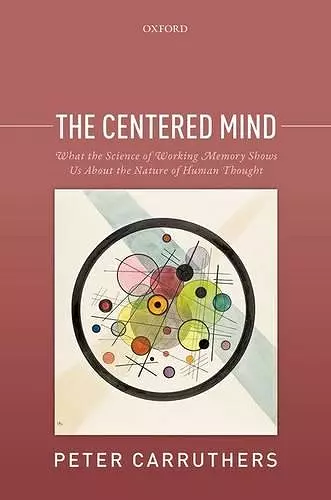The Centered Mind
What the Science of Working Memory Shows Us About the Nature of Human Thought
Format:Hardback
Publisher:Oxford University Press
Published:23rd Jul '15
Currently unavailable, and unfortunately no date known when it will be back
This hardback is available in another edition too:
- Paperback£31.49(9780198801320)

The Centered Mind offers a new view of the nature and causal determinants of both reflective thinking and, more generally, the stream of consciousness. Peter Carruthers argues that conscious thought is always sensory-based, relying on the resources of the working-memory system. This system has been much studied by cognitive scientists. It enables sensory images to be sustained and manipulated through attentional signals directed at midlevel sensory areas of the brain. When abstract conceptual representations are bound into these images, we consciously experience ourselves as making judgments or arriving at decisions. Thus one might hear oneself as judging, in inner speech, that it is time to go home, for example. However, our amodal (non-sensory) propositional attitudes are never actually among the contents of this stream of conscious reflection. Our beliefs, goals, and decisions are only ever active in the background of consciousness, working behind the scenes to select the sensory-based imagery that occurs in working memory. They are never themselves conscious. Drawing on extensive knowledge of the scientific literature on working memory and related topics, Carruthers builds an argument that challenges the central assumptions of many philosophers. In addition to arguing that non-sensory propositional attitudes are never conscious, he also shows that they are never under direct intentional control. Written with his usual clarity and directness, The Centered Mind will be essential reading for all philosophers and cognitive scientists interested in the nature of human thought processes.
This impressive, if difficult, book of 'theoretical psychology' critically integrates results from across the cognitive sciences into a theory of 'reflection'. ... [Carruthers] systematizes and advances 'global workspace' theories in the most comprehensive philosophical study yet of the sciences of 'working memory' ... Even readers who disagree with Carruthers' central claims will enjoy his rich discussions along the way of attention, motor imagery, temporal discounting, mind-wandering and creativity, fluid intelligence, animal cognition, and extended minds. * John Sutton, Australasian Journal of Philosophy *
a good example of the genre, meriting careful study from anyone interested in reflection and the stream of consciousness. Carruthers writes clearly and engagingly. He treats his traditional targets with respect. He presents an impressive array of empirical research while both getting into the details and fitting them all into an intelligible order. His aim throughout is to help us better understand the things themselves--reflection and the stream of consciousness -- not to grind some metaphilosophical axe ... I found reading his book and engaging with his reasoning to be instructive and illuminating. * Elijah Chudnoff, Notre Dame Philosophical Review Online *
Although the stream of consciousness seems intimately familiar to us, its underlying nature has been an enduring philosophical and psychological mystery. Carruthers presents a clear and deeply radical solution to this mystery, drawing together a massive array of empirical research in support of an attractively simple sensory-based account of conscious thought. He takes bold positions on a wide range of related issues, including the line between mental activity and passivity, the relationship between working memory and reflective thought, and the gap between our intuitive impressions of our conscious states and the real contents of those states themselves. For those who are curious about these questions, The Centered Mind is a terrific and accessible guide; for those who are already specialists in conscious thought, this book sets the agenda of future research. * Jennifer Nagel, University of Toronto *
Peter Carruthers has long been one of our foremost empirically informed philosophers of mind. In this book, he presents a persuasive account of the mechanisms underlying conscious thought and reasoning. Carruthers integrates a wealth of empirical work in the cognitive sciences to develop a novel conception of working memory as the heart of conscious thought and reasoning. Philosophically sophisticated and steeped in psychology and neuroscience, The Centered Mind is essential reading for philosophers and for cognitive scientists concerned with the nature of consciousness and the nature, powers and limits of conscious reasoning. * Neil Levy, Oxford Centre for Neuroethics / Florey Neuroscience Institutes, University of Melbourne *
ISBN: 9780198738824
Dimensions: 235mm x 162mm x 27mm
Weight: 604g
304 pages